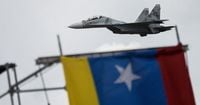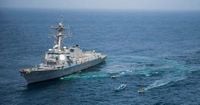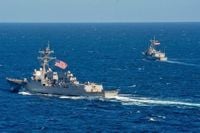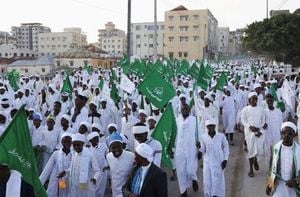On September 4, 2025, a pair of Venezuelan F-16 fighter jets swept low and close to the USS Jason Dunham, a U.S. Navy guided-missile destroyer patrolling international waters in the southern Caribbean Sea. The Pentagon’s response was swift and unequivocal, labeling the flyover as a “highly provocative move” and warning Venezuela’s leadership against further attempts to interfere with ongoing U.S. counter-narcotics and counter-terror operations. The incident, which played out against a backdrop of escalating tensions between Washington and Caracas, marks a dramatic new chapter in the region’s long-running struggle with transnational crime and political brinkmanship.
According to multiple U.S. Department of Defense statements posted on X (formerly Twitter), the Venezuelan aircraft’s approach was “designed to interfere with our counter narco-terror operations.” The USS Jason Dunham, part of a newly reinforced U.S. naval presence in the Caribbean and Pacific, found itself at the center of this high-stakes encounter. CBS News reported that the flyover was interpreted by U.S. officials as a deliberate show of force from the Venezuelan military. No shots were fired, and the U.S. vessel did not engage the aircraft, but the message was clear: the skies and seas off Venezuela are now a flashpoint in a rapidly intensifying confrontation.
This latest incident did not occur in a vacuum. Just two days earlier, on September 2, U.S. Marines launched a strike on a speedboat in the Caribbean Sea. According to President Donald Trump and Secretary of State Marco Rubio, the vessel was carrying suspected members of the Tren de Aragua, a Venezuelan gang that Washington recently designated as a foreign terrorist organization. The strike, which reportedly killed 11 people, marked a significant escalation from the U.S.’s previous approach of seizures and arrests to a more aggressive, kinetic campaign against drug traffickers operating in the region.
President Trump, who has made no secret of his administration’s hardline stance on Latin American crime, addressed the nation earlier in the week. He confirmed that he had ordered the strike and characterized it as a necessary step in the fight against narco-terrorism. The Pentagon, echoing Trump’s resolve, issued a stern warning: “The cartel running Venezuela is strongly advised not to pursue any further effort to obstruct, deter or interfere with counter-narcotics and counter-terror operations carried out by the U.S. military.”
Secretary of State Marco Rubio, speaking during a visit to Ecuador, left little doubt about the administration’s intentions. “President Donald Trump wants to wage war against narco traffickers,” Rubio declared, before branding Venezuelan President Nicolás Maduro as “an indicted drug trafficker in the United States, and he’s a fugitive of American justice.” Rubio explained, “Maduro is indicted by a grand jury in the Southern District of New York. That means the Southern District of New York presented the evidence to a grand jury, and a grand jury indicted him. And then a superseding indictment came out that was unsealed about a year and a half ago that specifically detailed Maduro’s actions.”
Rubio’s remarks were accompanied by news that two gangs, including Tren de Aragua, were being officially reclassified as foreign terrorist organizations. He also hinted at a coordinated international effort, saying “cooperative governments” would help the U.S. identify drug traffickers and “blow them up, if that’s what it takes.” The Pentagon, meanwhile, was reportedly deploying ten F-35 stealth fighter jets to Puerto Rico to bolster counter-narcotics missions in the Caribbean, further signaling a shift toward a more muscular U.S. military posture in the region.
For its part, the Venezuelan government has rejected the U.S. accusations and denounced the recent strike as an act of aggression. Venezuelan President Nicolás Maduro, speaking to state media, accused Washington of “seeking a regime change through military threat” and vowed that if attacked, he would mobilize the nation and declare “a republic in arms.” In a historic move, Maduro announced the activation of Venezuela’s National Militia, spanning the entire country, and characterized the moment as the “first time in history that the communal units of the militia will be activated, spanning the national map from north to south, from east to west, down to the last community.”
Venezuelan state media, while largely silent on the specifics of the aerial encounter with the USS Jason Dunham, focused instead on the show of national unity and military readiness. Maduro’s government has consistently denied any involvement in drug trafficking and dismissed the U.S. allegations as politically motivated. Caracas also accused the U.S. of committing extrajudicial killings in the recent strike, claiming, “they murdered 11 people without due process.” Legal experts cited by The New York Times and Al Jazeera have raised questions about the legality of the attack, noting that the Trump administration has not provided evidence that those on board the destroyed vessel posed an imminent threat or were armed. In the eyes of many, the victims were civilians, and the operation could be viewed as an extrajudicial killing under international law.
The U.S. campaign against Venezuela’s alleged drug trafficking networks has been steadily ratcheting up for months. In August 2025, Washington doubled its reward for information leading to Maduro’s arrest from $25 million to $50 million, underscoring the seriousness with which the administration views the Venezuelan leader’s purported ties to the cocaine trade. The deployment of several U.S. Navy ships and even a nuclear-powered submarine to the Caribbean and waters off Venezuela has only added to the sense of impending crisis.
Amid these military maneuvers and diplomatic barbs, the human cost and political stakes continue to rise. The U.S. says its operations are aimed squarely at criminal organizations and narco-terrorists, but the Venezuelan government and its supporters see a campaign of intimidation and a prelude to possible regime change. The region’s neighbors, meanwhile, watch nervously as two of the hemisphere’s most powerful militaries edge closer to open confrontation, with the Caribbean Sea as their stage.
As the dust settles from this week’s dramatic encounters, both sides appear unwilling to back down. The Pentagon’s warning to Venezuela remains on the table, and the Trump administration’s resolve appears undiminished. For Venezuela, the activation of the National Militia and Maduro’s defiant rhetoric suggest a government bracing for further conflict. Whether these moves are the prelude to deeper hostilities or a high-stakes game of brinkmanship, one thing is certain: the waters off Venezuela have rarely been so tense, nor the stakes so high.






